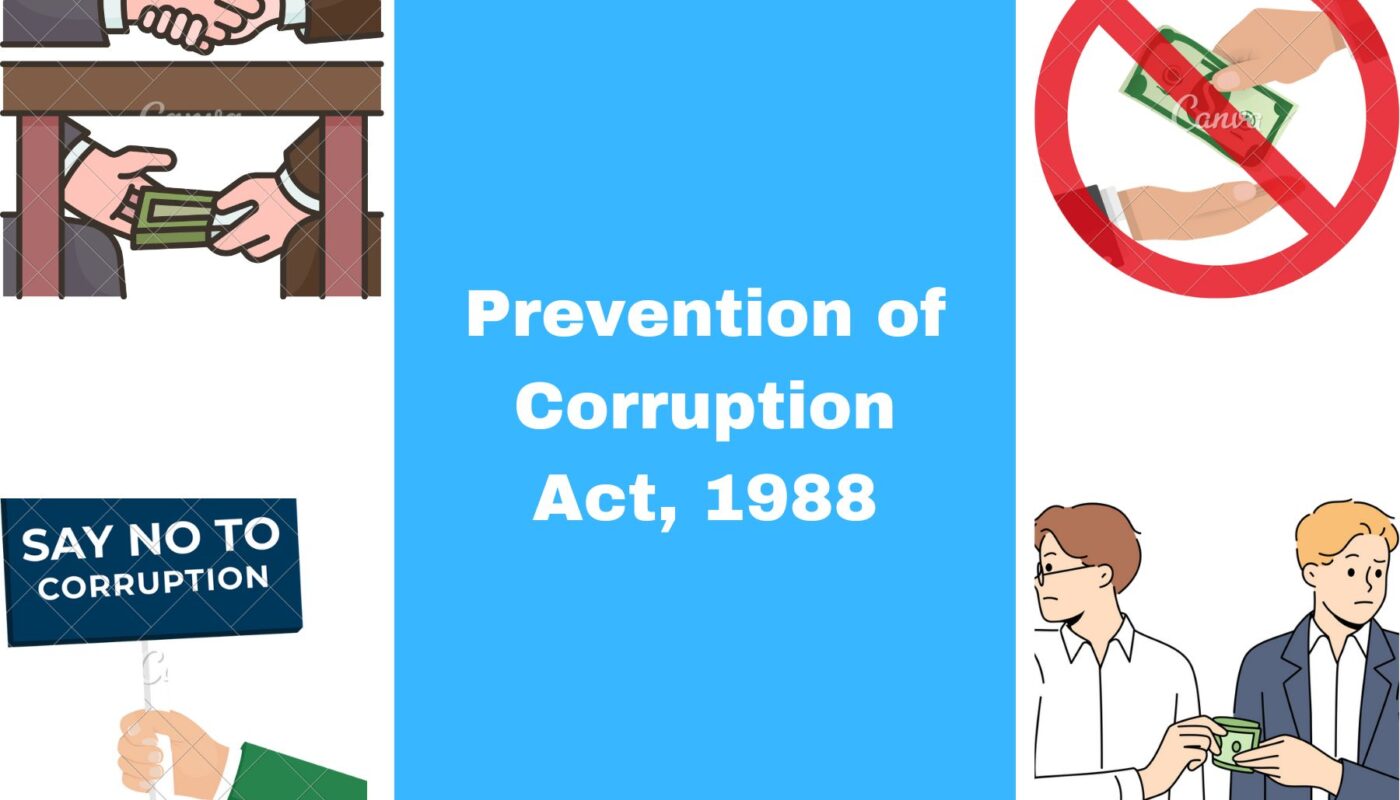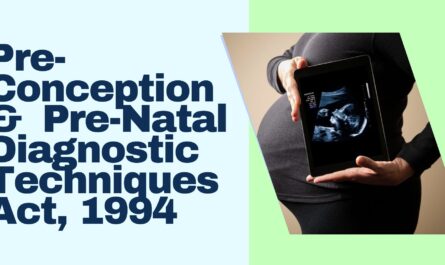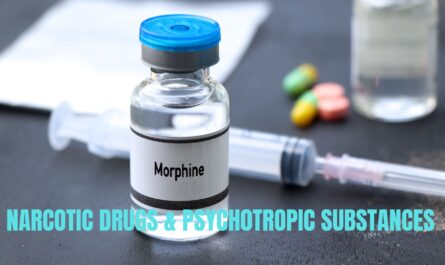Meaning of Corruption: The term ‘Corruption’ is derived from the Latin word “corrupts” meaning “corrupted”. Corruption refers to dishonest or deceitful behavior on account of the persons possessing power including government officials or other managers. Corruption certainly includes either giving or accepting inappropriate gifts and bribes, under table payments, money laundering, and black money, tampering elections and cheating the investors.
Prevention of Corruption Act, 1988: The Prevention of Corruption Act came into force on 9 September 1988 by the parliament of India. The territorial extent of the Prevention of Corruption Act extends to whole India including the citizens of India outside India. Parliament made this action to remove corruption in government agencies and public sector businesses in India. For almost 25 years no amendment was made in this act. The objective of the Prevention of Corruption Act is to reduce the corruption in India in various government agencies and public sector businesses by combating against them. However, it is not only limited to taking measures to prevent corruption in government departments but also involves prosecuting and punishing the public servants involved in activities of corruption. In addition, the act also takes into consideration the persons who helped the offenders in committing the offence of either bribery or corruption.
The prevention of corruption act, 1988 is the act of parliament of India. This act contains 31 sections and 5 chapters. Indian Penal code chapter IX deals with all offences by or relating to public servants. This chapter does not deal with misconduct and abuse of power by public servants. Section 161 to 165 of IPC deals with offences relating to corruption committed by the public servant. Then a special act that is the prevention of corruption act came into existence. Then the public servant act, 1947 was expanded in 1988 to clearly define all terms including public servant and making the definition of various offences very clear. On 26 July 2018, the narrow definition of criminal misconduct came into force. For almost 25 years no amendment was made in this act and was further amended in 2018 by the parliament of India. The important reason for the amendment was tightening up the existing provisions in the act and expanding the coverage of the offences.
Salient features of the Prevention of Corruption Act, 1988
Bribery: Bribery is explained U/S 171B IPC. Bribery means a person gives a gratification to any person with the object of inducing him or any person with the object of inducing him or any other person to exercise any electoral rights or of rewarding any person for having exercised any such rights. Both the person bribe giver and bribe taker have been made responsible for the offence. A person who commits this offence shall be punished with imprisonment for a term of 7 years.
Criminal misconduct: As defined under section 13 under the Act, Criminal misconduct means misappropriation of entrusted property.
Prosecution sanction: Sanction U/S 19(1) is needed for prosecution for offenses under the act for all serving or retired officials.
The time limit of cases: The courts have a complete trial of offences within two years. After recording reasons for the same, the court could extend this duration six months at a time up to a maximum of four years.
Commercial organization: The Act prescribes punishment of both directors as well the employees working in the commercial organizations by levying fine on the directors and employees indulged in bribery. They shall be punished with both imprisonment and fine.
Crimes punishable by the Prevention of Corruption Act, 1988: In cases where a public servant either accepts money or gifts in their official duty besides earning their salary in return for a favor from any individual. Any individual aiding the public servant in committing the offence.
In cases where an individual give or accepts gifts for influencing the public servant through his personal connection, illegal methods, corrupt methods, then such person influencing will also be punished.
In cases where the public servant is in charge of committing criminal misconduct.
In cases where the public servant indulges in accepting bribes or does corruption with the one having business relation or official relationship.
Key highlights of the Prevention of Corruption Act, 1988
Section 2 (d): The “undue advantage” means any gratification, other than legal remuneration. Gratification is not limited. Legal remuneration is permitted by a government organization and all the permissible to be received by the public servants. Public servants mean who are appointed by the government or not, who are in the actual possession of the situation. This implies that even non-pecuniary or non-monetary considerations such as gifts and favors not estimable in terms of money are also covered under “undue advantage”.
Section3: Appointment of Special Judges, The Central and the State Government is empowered to appoint Special Judges by placing a notification in the Official Gazette.
Section 4 (4): This section provides two a time limit of two years to complete a trial of the cases under the act. If the special judge is not able to complete the trial within 2 years; he has to record the reasons in writing and extend the completion period by six months. Such six-monthly extensions with reasons recorded in writing can extend the total trial period to the maximum limit of 4 years.
Section 5: Section 5 of the Act prescribes procedure and powers of Special Judge prescribed by the Cr.P.C. for the trial of warrant cases by the Magistrate.
Section 7: A public servant who obtains the undue advantage as a reward for the improper or dishonest performance of public duty. Public servants are defined as those persons who are appointed by the government. This section explains about the dishonest or improper performance of a public servant for illegal gains for money. In this offence the person shall be punished with an imprisonment of 3 years which can be extended to 7 years and fine.
Section 8: Any person who promises to give undue advantages to another person as a motive or reward to induce a public servant for improper performance of public duty. If a commercial organization has committed such offence, such organization shall be punished with a fine. The undue advantage could be given directly or by the help of the third party. The bribe taker shall be punished with imprisonment of a term of 7 years and fine.
Section 9: Bribing a public servant by a commercial organization: If a person is said to give promises to give undue advantage to a public servant if he has alleged to have committed an offence U/S 8 irrespective of whether or not he has been prosecuted for such offence. Any person who is associated with the commercial organization gives promises to give undue advantage to a public servant to retain the business of the commercial organization.
Section 12: Abetment of offences: If a person abets other people and commits the offence under this act, they shall be punished with an imprisonment of 3 years which can be extended to 7 years and fine.
Section 13(1): Criminal misconduct by a public servant: A public servant is said to commit the offence of criminal misconduct. If the person dishonestly or fraudulently misappropriates or otherwise converts for his use of any property entrusted to him or any property under his control as a public servant or allows any person to do so. The person shall be punished with imprisonment of term 5 years which may extend to 10 years and fine.
Section 14: Punishment for the habitual offender: A person is said to be a habitual offender when he has the habit of commits the same crime again and again. The habitual offender shall be punished with imprisonment for the term of 5 years which may extend to 10 years and fine.
Section 15: Punishment for attempt: A person who commits an offence of misappropriation of funds or property shall be punished with imprisonment of 3 years and fine.
Section 17A: Granting sanctions for the prosecution: The government needs the public officials for prosecution. The amended act extends the protection of requirement of prior approval to any inquiry, inquiry or investigation before prosecution. There will be no need of prior approval will be necessary for cases involving the arrest of a person on the spot on the charge of accepting or accepting to accept any undue advantage for himself or any other person.
Section 18 A: A provision of criminal law amendment ordinance, 1944 to apply to attachments under this act: shall as far as may be, apply to the attachment, administration of attached property and execution of the order of attachment or confiscation money or property procured through an offence under this act.
Section 29: Powers to make rules: The central government has the power to make rules for carrying out the provisions of the act.
Offences and Punishments Under the Prevention of Corruption Act, 1988
| Sections | Offence Description | Punishment |
| 7 | Public Servant Being Bribed: Seeking undue advantage improperly Receiving undue advantage for dishonest job performance Performing job improperly due to received undue advantage | Imprisonment:3 to 7 years& Fine |
| 7(a) | Taking Undue Advantage to Influence Public Servant: Obtaining undue advantage to influence a public servant improperly Using corrupt or illegal means or personal influence | Imprisonment:3 to 7 years & Fine |
| 8 | Bribing a Public Servant: Giving undue advantage to induce improper job performance or rewarding dishonest performance Exceptions: Person Forced to give Such undue advantage Reporting incident to authorities within 7 days Commercial organization shall be fined. | Imprisonment: Upto 7 years & Fine |
| 9 | Bribing a public servant by a commercial organization | Fine Only |
| 10 | Person in charge of commercial organization to be guilty of offence u/sec 9 : For Example- Director, manager, secretary or other officer | Imprisonment:3 to 7 years & Fine |
| 11 | Public servant obtaining undue advantage without consideration: Public servant unfairly benefits without good reason or for too little in return | Imprisonment:6 months to 5 years & Fine |
| 12 | Punishment for abetment of offences: Encouraging or assisting another person in committing an offense | Imprisonment:3 to 7 years & Fine |
| 13 | Criminal misconduct by a public servant: Misappropriation or improper conversion of entrusted property Improper enrichment while in office | Imprisonment:4 to 10 years & Fine |
| 14 | Punishment for habitual offender: Subsequent offence after prior conviction under this Act | Imprisonment:5 to 10 years & Fine |
| 15 | Punishment for Attempt: Attempting to commit offenses described in Section 13(1)(a) | Imprisonment:2 to 5 years & Fine |
| 16 | Matters to be taken into consideration for fixing fine: | Court considers value of property or unexplained wealth |
Investigations of Prevention of Corruption Act, 1988
Investigation of corruption cases is done by a police officer, Section 17 of the Prevention of Corruption Act, 1988, illustrates powers authorized to investigate the cases. It states that “no police officer below the rank,
Inspector of Police: in the case of the Delhi Special Police Establishment, of an Inspector of Police;
Assistant commissioner of Police: in the metropolitan areas of Bombay, Calcutta, Madras, and Ahmedabad and in any other metropolitan area…, of an Assistant Commissioner of Police; and
Deputy Superintendent of Police: elsewhere, of a Deputy Superintendent of Police or a police officer of equivalent rank, shall investigate any offence punishable under this Act without the order of a Metropolitan Magistrate or a Magistrate of the first class, as the case may be, or make any arrest therefor without a warrant.”
It means that no officer other than approved officials can conduct investigations or make arrests until an order is obtained from the Metropolitan Magistrate or Magistrate of First Class.
Inspector of Police authorized by state government: Provided that if a police officer not below the rank of an Inspector of Police is authorized by the State Government in this behalf by general or special order, he may also investigate any such offence without the order of a Metropolitan Magistrate or a Magistrate of the first class, as the case may be, or make arrest therefor without a warrant:
CBI, State ACBs & Vigilance Department: The higher rank officials including the Central Bureau of Investigation (CBI), state Anti-Corruption Bureaus (ACBs), and Vigilance Departments investigate corruption cases. These agencies possess wide-ranging powers, such as search and seizure, interception of communications, and the authority to arrest individuals suspected of corrupt practices.
Jurisdiction of CBI: The CBI is a premier investigative agency with jurisdiction over corruption cases involving central government employees and public servants.
Jurisdiction of State ACBs: State ACBs are responsible for investigating corruption cases within their respective states. Additionally, Vigilance Departments in various government departments and organizations have the authority to probe corruption allegations against their own employees. These authorized entities play a crucial role in uncovering corruption, gathering evidence, and initiating legal proceedings against the accused.
Limitations on Police Investigations: Section 17A of the 2018 Amendment Act: Apart from this, there are certain restrictions related to the investigation in some cases which are mentioned under Section 17A of the Amendment Act, 2018. It illustrates that no police officer can investigate the case if it involves a decision/recommendation made by a public servant in the course of his official responsibilities. If such an investigation is to be performed then the approval of the Central Government involving Union matters and State Government involving state affairs is required.
Attachment of Property: Section 17C of the Act empowers authorities to take action to prevent the disposal or transfer of properties that are suspected to be proceeds of corruption or linked to corrupt practices. The Act allows for the attachment of any property, both movable and immovable, which is believed to be the proceeds of corruption or connected to corrupt activities. This includes assets acquired through illegal gratification or disproportionate to the known sources of income. As defined in the Act, the competent authority has the power to initiate the attachment proceedings. This authority is usually a designated officer or an agency responsible for investigating corruption cases, such as the Central Bureau of Investigation (CBI) or state Anti-Corruption Bureaus (ACBs).
Forfeiture of Property: According to Section 18A of the Prevention of Corruption Act, 1988, the attachment and forfeiture of property is performed under the provisions of the Criminal Law Amendment Ordinance, 1944. In context with this Act, the references to ‘District Judge’ in the Criminal Law Amendment Ordinance, 1944 are construed as references to ‘Special Judge’.
Appointment of Special Judges Under the Prevention of Corruption Act, 1988
Appointment of Special Judges, Section 3 Appointment of Special Judges: The Central Government or State Government can appoint special judges through an official notification in the Gazette for specific areas or cases.
Any offense punishable under this Act.
Any conspiracy, attempt, or abetment related to the offenses mentioned in (a).
Qualifications for Special Judges: To be eligible for appointment as a special judge under this Act, a person must have served as a Sessions Judge, Additional Sessions Judge, or Assistant Sessions Judge under the Code of Criminal Procedure, 1973.
Section 4 – Cases Triable by Special Judges: Special Judges, designated under the Prevention of Corruption Act, are the only ones allowed to handle corruption cases mentioned in Section 3(1) of the Act. Regular courts can’t handle these cases.
Jurisdictional Roles of Special Judges in Corruption Cases: The Special Judge responsible for a specific area handles cases related to corruption that occur within that area. If there are multiple Special Judges in an area, the Central Government can specify which one should handle a particular case.
Expanded Jurisdiction of Special Judges in Multi-Offense Trials: Special Judges can also try other related offenses not specifically listed in Section 3. For instance, if a person is accused of corruption and other crimes under regular criminal law, these can be tried together in one trial.
Speedy Trial: The Act stresses the need for a quick trial. Ideally, a corruption case should be completed within two years. If it takes longer, the Special Judge must provide reasons for the delay. Extensions, up to six months at a time, are allowed, but the total trial duration should not typically exceed four years.
Section 5 Procedure and Powers of Special Judge
Legal Proceedings: A special Judge can begin legal actions against people accused of corruption without a preliminary step. During the trial, they follow the same rules as magistrates.
Offering Pardon: If someone involved in corruption cooperates fully by sharing all the information they know about the crime abettor and others involved, the special Judge can grant them a pardon.
Regular Legal Procedures: Except for certain exceptions, regular legal procedures apply in cases before a special Judge. The special Judge’s court is like a Court of Session, and the person prosecuting the case is a public prosecutor.
Specific Provisions: Certain sections of the Code of Criminal Procedure, 1973, such as sections 326 and 475, are specifically applied to proceedings before a special Judge. In these cases, the special Judge is treated as a magistrate.
Sentencing Authority: A special Judge has the authority to impose any legally permissible sentence on a person who has been convicted of a corruption offense.
Exercise of Powers: When handling cases involving offenses under this Act, a special Judge has the same powers and functions as a District Judge under the Criminal Law Amendment Ordinance, 1944.
Section 6 – Power to Try Summarily: If a special Judge is trying a case involving a public servant who has allegedly violated specific orders related to the Essential Commodities Act, 1955, or other specified orders, the special Judge can use a quicker “summary” trial method, even if regular procedures call for a longer process.
Summary Trial Rules: During a summary trial, certain rules (sections 262 to 265 of the Code of Criminal Procedure) apply, making the process more streamlined.
Maximum Sentence: In a summary trial, if the accused is found guilty, the special Judge can only give a maximum sentence of one year in prison.
Exception to Summary Trial: If the special Judge believes that a longer prison term might be necessary or for other reasons, they can decide to stop the summary trial and proceed with a more standard trial, following the procedures for warrant cases by magistrates.
No Appeal for Short Sentences: If the special Judge sentences the accused to one month or less in prison and fines not exceeding two thousand rupees (with or without additional orders), there can be no appeal. However, if the sentence exceeds these limits, the convicted person can appeal.



